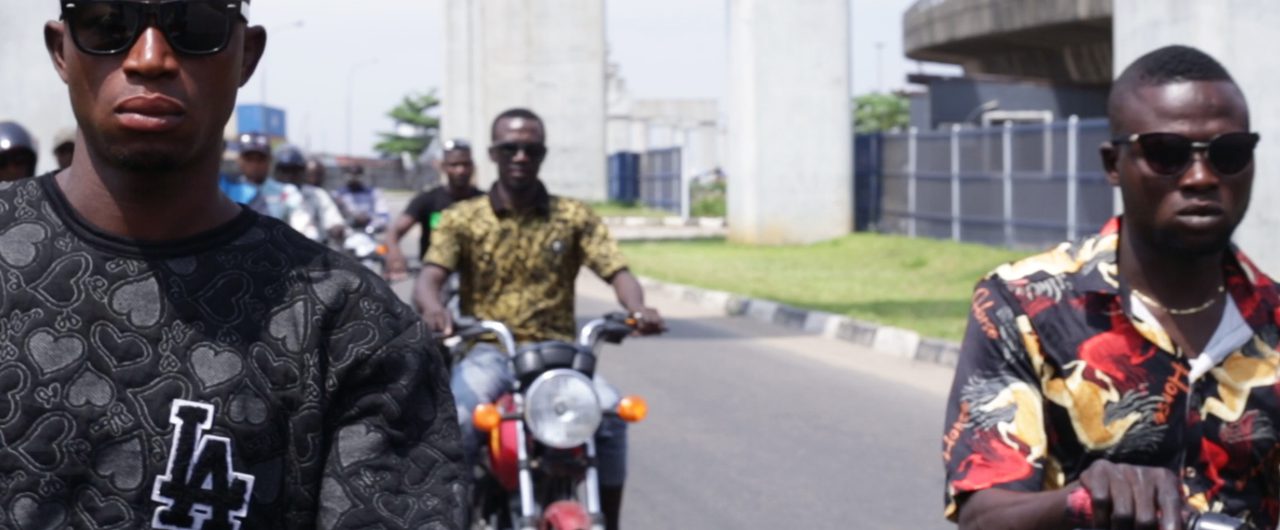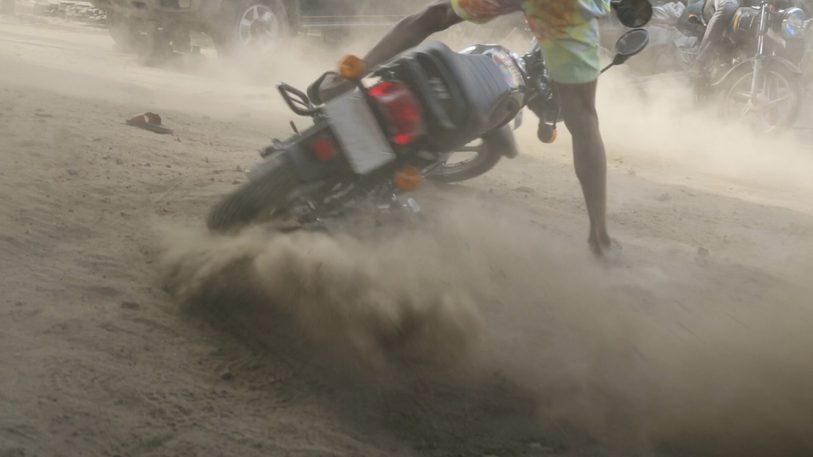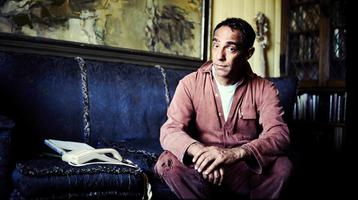
Chrystel Oloukoï
Karimah Ashadu’s raw and explosive short Machine Boys (2024) opens with a close-up of the casqued head of a motorbike-taxi driver. Visor down, the helmet reflects the urban landscape, keeping us at a distance — mediated by the camera, the rider holds our gaze, but strategically withholds his. The opacity of helmets, sunglasses and side mirrors redoubles the cinematic lens, and manifests an oppositional, counter-gazing stance. In a voiceover decoupled from the image, a series of anonymous riders narrate encounters with brutality at the hands of the police, government task forces and area boys — or local thugs. The okada riders meet us with a disarming mix of visual defiance and tactical aural vulnerability. The film operates as a contradictory mode of portraiture: the constant blend of anonymity and posturing, fragility and aggression affirms the intractable opacity of its subjects.
Machine Boys explores the precarity of the okada trade in the wake of the 2022 ruling to outlaw commercial motorcycles in Lagos — the latest in many unsuccessful attempts. Authorities have long blamed okadas for the city’s staggering rate of road accidents, even as official statistics indicate that cars and danfos (commercial minibuses) induce many more. The film extends Ashadu’s longstanding engagement with (post)colonial visions of modernity, at the expense of popular livelihoods and local ways of getting by. Okadas first appeared in Edo State, as unemployed university students took up motorcycle taxis in the wake of the devastating IMF-imposed structural adjustment programs in the late 1980s. The riders borrow their name from the defunct Nigerian airline Okada Air, channelling its reputation for speed and efficiency. In a megalopolis of over 20 million inhabitants, with intractable gridlocks and infrastructural challenges, okadas have become a vital means of navigating an urban landscape of narrow, congested and pothole-riddled roads for a majority of low- and middle-income earners.

Karimah Ashadu, Machine Boys (2024), video still. Courtesy of the artist, Fondazione In Between Art Film and Sadie Coles HQ, London.
Premiered at the 60th Venice Biennale, at which the British-Nigerian artist was awarded the prestigious Silver Lion Prize, Machine Boys skilfully merges a documentary approach with experimental cinematography. Claustrophobic close-ups meticulously sweep over the sweat- and dust-covered bodies of riders and bikes alike, before unfurling onto the broader urban tapestry of Lagos’ underbridges and highways. The fragmented experiences disclosed in the voiceover form a polyphonic narrative of the multiple meanings of okada work. Recalling Ashadu’s exploration of a life of independence in Cowboy (2022), one rider marvels at the possibility of being his own boss and the freedom afforded by solo entrepreneurship. Another recounts how he financed his education, while a Northern migrant reflects on how working as an Okada gave him a way to interpret and claim the city. Others bide their time, longing to quit a trade that exposes them to harm and exploitation as soon as they can earn enough capital.
Machine Boys joins a number of prior works by Ashadu on labour, masculinity and colonial afterlives, primarily in Nigeria. Working class men in particular are often in focus, for instance at the Makoko abattoirs in King of Boys (2015), with artisanal miners in the Jos region in Plateau (2022), or in the construction industry in Lagos Sand Merchants
(2013). Part of her interest in labour lies in the intimacies developed between people, tools, and sites of work. In the two-channel Red Gold (2016) — with a rare focus on working class women — ochre and thick palm oil in open air sludge pits permeates everything, from the muddy surrounds to the limbs of the women, knee-deep in the viscous liquid, scooping out fibrous dregs under the fiery sun. The scene is reminiscent of the blue indigo-stained hands of Gullah Geechee women in Julie Dash’s 1991 Black cinema landmark, Daughters of the Dust. The body, our primary instrument of labour, is also irremediably altered by it. Towards the closing point of Machine Boys, a sunglassed okada rider starts roaring at the camera in crescendo, harmonizing with the sound of a bike engine in the background like a kindred spirit. Throughout, he stares straight into the camera.

Karimah Ashadu, Machine Boys (2024), video still. Courtesy of the artist, Fondazione In Between Art Film and Sadie Coles HQ, London.
Trained in painting before shifting her focus to moving image, Ashadu often employs unusual camera apparatuses and mounting techniques, meant to defamiliarize and reframe perspectives. In Pace (2011) she straps multiple cameras to her body while roaming a defunct London viaduct. In subsequent works, she experiments with makeshift apparatuses, specifically designed out of found objects. In Lagos Island (2012), a single camera rotates, enclosed in a tire-wheel mechanism, evoking the cycles of forced evictions and displacements many beach communities — here Togolese migrants — have been subjected to by a state eager to use the land for real estate development and speculation. Instead of frictionless movement and silence, Ashadu’s intricate camera apparatuses are purposefully unwieldy, squeaking, grinding, playful and unruly.
It is no surprise then to see Ashadu take us for a wild ride in Machine Boys, strapping her camera to what seems to be a bike in motion amidst a choreography of bikes and dust suspended in their wake. The documentary elements of the film stand in sharp contrast with camera work that is almost like a performance. Under Ashadu’s keen eye, the road is a pageant runway. Alongside the bodies of the riders, bikes also become means of self-expression, with, for instance, the customized neon purple headlights which give the film its title card colours. At the Venice Biennale, the film played out in a room bathed in purple light. Machine Boys unfolds in a chorus of engines whirring, rumbling and roaring as the okada riders compete for sonic and visual mastery. Clad in luxury brand imitations and other signs of a globalized world from worn out Gucci leather sandals to Versace shades and Barcelona helmets, they boldly pose in front of the camera. Cruising through the streets of Lagos, most might not afford okadas more than a glance, as they speed through highways or loiter at the edges of bridges, alleys and bus stops, looking for customers while avoiding extortion by the police. Offering a sharp insight into lives defined by movement, Machine Boys compels prolonged looking and listening to the suppressed but insistent uproar of the city’s underbelly.
Chrystel Oloukoï is a writer who specialises in experimental cinema, queer cinema, and Black continental & diasporic cinema. They hold a PhD from Harvard University and work at the University of Washington. Their writing has appeared in Air Afrique,Film Comment, Metrograph, The Criterion Channel, Sight & Sound and World Records among other places.



